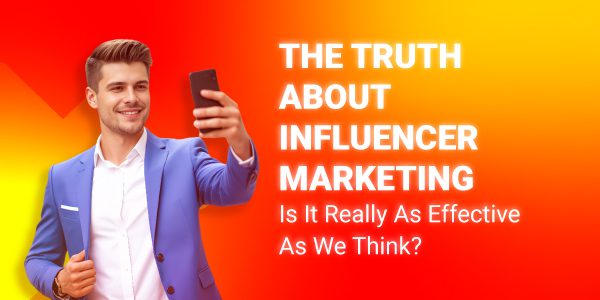Behind the Hype: Is Influencer Marketing All It’s Cracked Up to Be?
Influencer marketing has risen to prominence over the last decade, often hailed as a game-changer in digital marketing. With its promise of genuine connections between brands and their audiences, it’s easy to see why. But as the initial excitement wears off, a critical question remains: Is influencer marketing truly effective, or is it a flashy trend with inflated ROI and questionable results?
Recent data pushes us to dive deeper. While influencer marketing still holds its ground, a closer look reveals that the effectiveness we’ve been promised is not always guaranteed. From inflated follower numbers to superficial engagement metrics, it’s time to assess whether this approach still has the power to drive real results.
The Follower Game: How Transparent Are Those Numbers?
One of the most persistent issues with influencer marketing is the lack of audience transparency. It’s easy to be dazzled by huge follower counts, but many of these numbers are misleading. Research shows that between 15-25% of followers on platforms like Instagram and TikTok could be fake accounts, bots, or inactive users, depending on the niche.
When a brand invests in impressions that don’t even reach real people, the return is a mirage. Without a deep audience audit beforehand, investing in influencer campaigns can be like buying ads on billboards in the desert—visible, but ineffective.
From Superficial Engagement to Real Conversions
What initially made influencer marketing attractive was its authenticity—the genuine, off-the-cuff endorsements by influencers who truly believed in the products they were sharing. This type of real connection built trust with audiences, in contrast to traditional ads.
But as brands caught on to the economic potential, this authenticity quickly turned into scripted promotions. Instead of influencers freely sharing their honest opinions, they became brand spokespeople, reading from pre-written scripts. This shift raised doubts: Is this endorsement real, or just another paid advertisement?
Kurasity Insight: The real challenge is to distinguish between engagement and actual intent to purchase. Without aligning influencers’ content with measurable outcomes, brands risk wasting their investment on empty engagements.
Measuring Success: Are We Really Seeing the Return on Investment (ROI)?
Despite optimistic reports from the industry, only 30% of companies claim to have solid methodologies in place to accurately measure ROI from influencer campaigns. This leaves many operating on momentum or simply jumping on the influencer marketing bandwagon.
A 0.5%-2% direct conversion rate from influencer-driven campaigns isn’t uncommon. While influencer marketing might generate buzz, it rarely leads to direct purchases. It’s a reminder that visibility alone isn’t enough—brands need to turn that visibility into tangible business results.
The Crisis of Authenticity: Can Influencers Really Be Trusted?
Another myth surrounding influencer marketing is that their content is inherently more authentic than traditional advertising. However, the oversaturation of paid promotions has created an opposite effect: consumers now view these partnerships as just another form of advertising.
Research from Edelman indicates a 10% decline in the trustworthiness of influencers over the last two years. Consumers are becoming more skeptical of sponsored content. As influencers continue to push products for a paycheck, they risk losing trust and credibility.
A Highly Competitive Industry with Inflated Costs
As influencer marketing became mainstream, prices skyrocketed. A celebrity influencer with millions of followers can charge between $5,000 to $20,000 per post. The problem? Much of this spending is based on metrics that don’t fully reflect value.
And let’s not forget the reputational risk. If an influencer steps out of line—whether due to a controversial comment, inappropriate behavior, or personal scandal—it can quickly reflect poorly on the brand. In fact, partnerships with influencers can increase the risk of brand crises by up to 20% if their behavior isn’t carefully managed.
From Influencers to Celebrities: The Blurring of Lines
In the past, celebrities and influencers operated in separate spaces. But as influencers gained more traction, traditional celebrities began adopting influencer strategies, sharing personal moments on social media and partnering with brands for sponsored posts. This merging of worlds has led to the over-commercialization of influencer marketing, where genuine connections have been replaced by predictable, scripted endorsements.
The Industry of Influence: A High-Priced Business
The influencer marketing industry has evolved into a complex ecosystem. Today, agencies, intermediaries, and talent marketplaces drive a significant portion of the industry. However, this business model often results in less investment directly in content creators and more in agency fees and overheads. A 40% chunk of influencer marketing budgets is often consumed by agencies, leaving just less than half to be invested in the actual influencer.
As a result, many campaigns are standardized and lack the customization that once made influencer marketing feel authentic. Influencers are becoming commoditized assets, and agencies prioritize volume over strategic alignment, producing more campaigns without a clear connection to business goals.
Building a More Realistic Approach to Influencer Marketing
While influencer marketing can work, it’s not a guaranteed solution. To truly harness its power, brands must go beyond the hype and embrace a more strategic, data-driven approach. This means targeting the right influencers, ensuring audience authenticity, setting clear goals, and focusing on tangible results—not just visibility.
En Kurasity, we believe that influencer marketing can be a powerful tool when it’s executed strategically. Through precise audience targeting, audience authenticity verification, and data-backed strategies, we help brands achieve true, measurable success.
Ready to make your influencer marketing more than just a trend? Let Kurasity guide you to strategies that deliver real results and avoid the pitfalls of overhyped campaigns.







